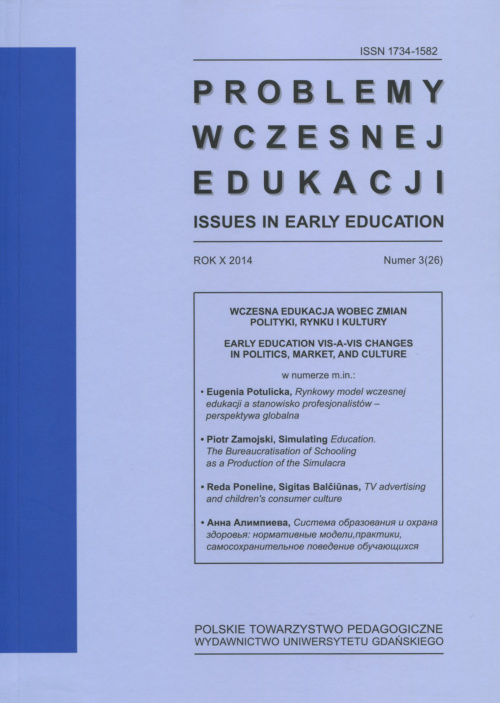Simulating education. The bureaucratisation of schooling as a production of the simulacra
Słowa kluczowe:
schooling, bureaucracy, documenting, simulation, simulacraAbstrakt
The argument presented in this article stems from the experience of being engaged in a debate with schoolteachers, who pointed to the bureaucratisation of schooling as their main concern. Taking their way of formulating this problem as a guidepost for my thinking I have made an attempt aiming at understanding the link between bureaucracy and schooling. Starting from Max Weber classical view, thanks to its critique made by Claude Lefort I try to interpret the bureaucratisation of schooling with reference to Jean Baurillard theory of simulation as the production of the simulacra.
Downloads
Bibliografia
Apple M.W. (2005), Education, markets, and an audit culture. “Critical Quarterly”, 4 (1–2).
Arendt H. ([1958] 1998), The Human Condition. Chicago – London, The University of ChicagoPress.
Arendt H. ([1968] 2006), Between Past and Future: Eight Exercises in Political Thought. New York,Penguin.
Arendt H. (2003), Personal Responsibility Under Dictatorship. In: J. Kohn (ed.), Hannah Arendt,Responsibility and Judgment. New York, Schocken Books.
Ball S.J. (2001), Performativities and fabrications in the education ceremony: Towards the performative society. In: D. Gleeson and C. Husbands (eds.), The performing school: Managing, teaching and learning in a performance culture. London, Routledge Falmer.
Baudrillard J. ([1981] 1983), Simulations. Transl. Paul Foss, Paul Patton, Philip Beitchman. New York, Semiotext[e].
Bauman Z. (1989), Modernity and the Holocaust. Cambridge, Polity Press.
Biesta G.J.J. (2004), Education, Accountability, and The Ethical Demand: Can The Democratic Potential of Accountability Be Regained? “Educational Theory”, 54 (3).
Biesta G.J.J. (2006), Beyond Learning. Democratic Education for a Human Future. Boulder-London, Paradigm Pub.
Biesta G.J.J. (2007), Why ‘What Works’ Won’t Work: Evidence-Based Practice and The Democratic Deficit in Educational Research. “Educational Theory”, 57 (1).
Biesta G.J.J. (2010a), Good Education in the Age of Measurement. Ethics, Politics, Democracy. Boulder – London, Paradigm Pub.
Biesta G.J.J. (2010b), Why ‘What Works’ Still Won’t Work: From Evidence-Based Education to Value- Based Education. “Studies in Philosophy and Education”, 29.
Bothe J. (2001), School Bureaucracy and Student Performance at the Local Level. “Public Administration Review” 61 (1).
Carlile A. (2012), ‘Critical bureaucracy’ in action: embedding student voice into school governance. “Pedagogy, Culture & Society” 20 (3).
Díaz de Rada Á. (2007), School bureaucracy, ethnography and culture: Conceptual obstacles to doing ethnography in schools. “Social Anthropology/ Antropologie Sociale” 15 (2).
Endres, B. (2007), The Conflict between Interpersonal Relations and Abstract Systems in Education, “Educational Theory” 57 (2).
Habermas, J. ([1981] 1987), The Theory of Communicative Action. Vol. 2. Transl. Thomas McCarthy. Boston MA, Bacon Press.
Hegel G.W. F. ([1821] 1991), Elements of the Philosophy of Right, A.W. Wood (ed.), transl. H.B. Nisbet. Cambridge, Cambridge University Press.
Honig M.I. (2006), Street-Level Bureaucracy Revisited: Frontline District Central-Office Administrators as Boundary Spanners in Education Policy Implementation, “Educational Evaluation and Policy Analysis”, 28 (4).
Horkheimer M., Adorno T.W. ([1944] 1973), Dialectic of Enlightenment. Transl. John Cumming. New York, Continuum.
Horkheimer M. ([1947] 2004), Eclipse of Reason. London – New York, Continuum.
Jurczyk M. (2010), Relacja między biurokratycznym a twórczo-refleksyjnym aspektem pracy nauczyciela w wymiarze deklaracji i działania pedagogicznego [On the Relation Between the Bureaucratic and the Creative / Reflective Aspect of Teacher’s Work in Declarations of Teachers and Their Actions], Bachelor Thesis, manuscript, University of Gdańsk.
Lefort C. ([1960] 1986), What is bureaucracy? Transl. John B. Thompson. In Claude Lefort, The Political Forms of Modern Society. Bureaucracy, Democracy, Totalitarianism. Edited and introduced by J.B. Thompson. Cambridge MA, The MIT Press.
Maguire M., Perryman J., Ball S., Braun A. (2011), The ordinary school – what is it? “British Journal of Sociology of Education”, 32 (1).
Masschelein J. (2011), Experimentum Scholae: The World once More… But Not (Yet) Finished. “Studies in Philosophy and Education”, 30 (5).
Meyer H-D. (2010), Local Control as a Mechanism of Colonization of Public Education in the United States. “Educational Philosophy and Theory” 42 (8).
Power M. (1994), The Audit Explosion. London, Demos.
Power M. (1997), The Audit Society: Rituals of Verification. Oxford, Oxford University Press.
Sager F., Rosser Ch. (2009), Weber, Wilson and Hegel: Theories of Modern Bureaucracy. “Public Administration Review”, 69 (6).
Smith K.B., Larimer Ch. W. (2004), A Mixed Relationship: Bureaucracy and School Performance. “Public Administration Review”, 64 (6).
Szomburg J. (2011), Podmiotowość dla rozwoju. IV Pomorski Kongres Obywatelski [Subjectivity and Development. The Fourth Pomeranian Civic Congress]. Gdańsk, Instytut Badań nad Gospodarką Rynkową.
Weber M. ([1921] 1978), Economy and Society. An Outline of Interpretative Sociology. Transl. Ephraim Fischoff et al, Guenter Roth, Claus Wittich (ed.). Berkeley – Los Angeles – London, University of California Press.
Weber M. ([1904] 2004), The ‘objectivity’ of knowledge in social science and social policy. Transl. Keith Tribe. In: S. Whimster (ed.), The Essential Weber: A Reader. London, Routledge.
White H. (1978), The Content of the Form. Narrative Discourse and Historical Representation. Balitmore – London, The John Hopkins University.
Zamojski P. (2011), Pomyśleć szkołę inaczej… Edukacja matematyczno-przyrodnicza w toku debat publicznych [Re/thinking school… Science education in public debates], Gdańsk, Fundacja Rozwoju Uniwersytetu Gdańskiego. http://www.edunews.pl/badania-i-debaty/opinie/1446-budujmy- spoleczne-srodowisko-oswiatowe (21.03.2011).

 Uniwersyteckie Czasopisma Naukowe
Uniwersyteckie Czasopisma Naukowe





